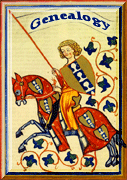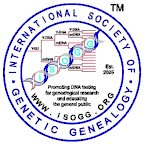Member Tests in Progress at FTDNA as of 12/24/2014
Due Date, Batch #, Kit #, Type of Test
12/11/2014, 594, 336507, Y-DNA 37
12/11/2014, 594, 369346, Mt-DNA Plus and Y-DNA 37
12/18/2014, 595, 345273, Y-DNA 37
12/25/2014, 596, 373605, Y-DNA 37
12/25/2015, 596, N62146, L1402
01/01/2015, 600, 112572, Family Finder
01/01/2015, 597, 361064, Backbone
01/07/2015, 593, 368674, Y-DNA 37
01/07/2015, 593, 369497, Y-DNA 37
01/08/2015, 598, 374276, Y-DNA 37
01/15/2015, 599, 374339, Y-DNA 37
01/22/2015, 600, 376378, Y-DNA 37
01/29/2015, 601, 109492, Y-DNA 67
01/29,2015, 601, 246259, Y-DNA 67
01/29/2015, 601, 353516, Y-DNA 67
01/29/2015, 601, 380798, Y-DNA 37
01/29/2015, 601, 381707, Y-DNA 37
EXPLANATION OF TESTS:
Y-DNA Test: This is a test of a man’s Y chromosome and it is a male specific test. Women do not have a Y chromosome. The Y chromosome is handed down from father to son over the generations, so results of this test are used to confirm or disprove a genealogical connection on the direct paternal line. There are five different levels of yDNA tests offered by FTDNA: 12 markers, 24 markers, 37 markers, 67 markers and 111 markers.
Big Y Test: This is another direct paternal lineage Y chromosome test designed to explore ancient, deep ancestral links on the universal paternal tree. It is intended for expert users with an interest in advancing science, not personal genealogy. This is an anthropological test, not a genealogical test.
MT-DNA Test: This is a test of mitochondrial DNA which is found in both men and women. It traces the direct maternal line without influence from other lines. Because mtDNA mutates very slowly, this test is more of an anthropological test than a genealogical test. FTDNA offers the following mtDNA tests: HVR1, HVR1 and 2, and Full Sequence (FGS) or Mega test.
Super DNA Test: This is a combination of a male specific-chromosome 67 marker test for the direct paternal line and the Full Mitochondrial Sequence (FMS) test for the direct maternal line. Results identify the ethnic and geographic origin of the maternal and paternal lines of the individual being tested.
Family Finder Test: This is a test of autosomal DNA which is found in both men and women. It is designed to trace most of your ancestral lines and it can identify relationships up to five generations back from you with confidence.
Family Finder Conversion is the conversion of the original Family Finder test to a new platform called the Illumina Omni platform. The new microarray chip tests about 710,000 unique autosomal DNA SNPs. FTDNA is changing to the new platform because it offers better potential for future upgrade options.
Backbone Test: When you take any of the yDNA or mtDNA tests at FTDNA, your results include a free haplogroup determination. Haplogroup is similar to nationality and reflects your very deep, ancient ancestry. If your yDNA test is inconclusive, FTDNA will perform a free Backbone SNP test to determine your basic haplogroup designation.
Deep Clade Test: Once you know your Y chromosome male haplogroup, you may then focus on your branch of the phylogenetic tree through subclade testing, also known as Deep Clade testing. FTDNA currently offers Deep Clade tests for Haplogroups E, G, H, I, J, N, O, and R.
SNP Test: You may also focus on your branch of the phylogenetic tree through testing for specific Single Nucleotide Polymorphisms (SNPs) which help determine your specific subclade. The L257 SNP test is one example.
Kittler Test: This is an advanced test of one double marker called DYS385a/b. By convention, the lowest value is always listed first and the highest value second. This test will allow you to see the actual order of DYS385a/b. For example, DYS385a/b is usually 14-11 in Haplogroup R1b and is usually 11-14 in Haplogroup R1a.
DYF371X Test: This is an advanced test that determines why certain individuals have a null value for DYS425, which is a fairly rare event.
DYS464X Test: This is an advanced test of DYS464, a fast-moving multi-copy DNA marker. It could be called a “quazi-SNP” test and it has value for exploring both genealogy and anthropology.
Factoids: This is a lighthearted “cocktail party” test of predisposition to certain physical traits or conditions. The list of factoids available to be tested include the following: alcohol flush reaction, avoidance of errors, back pain, bitter taste perception, caffeine metabolism, earwax type, freckling, longevity, male pattern baldness, muscle performance and nicotine dependence.


